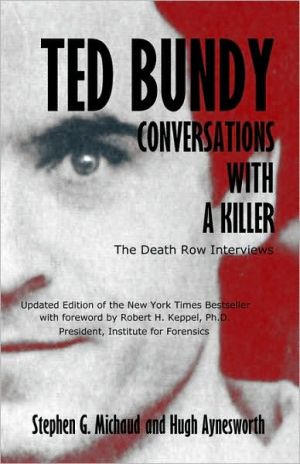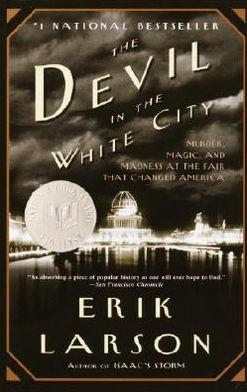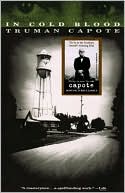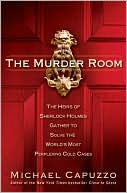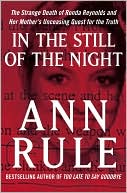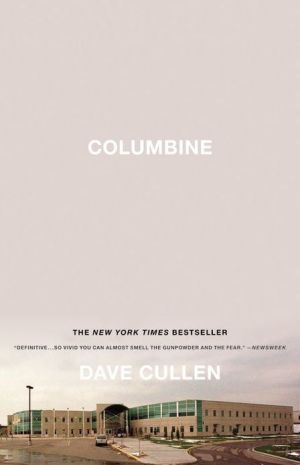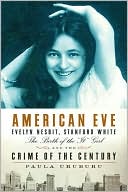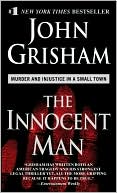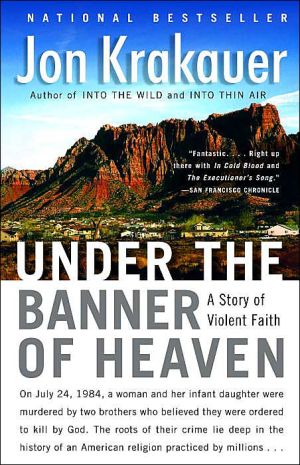Ted Bundy: Conversations with a Killer: The Death Row Interviews
Drawn from more than 150 hours of exclusive tape-recorded interviews with Bundy, this collection provides shocking insights into the killer's 11th-hour confessions before his death in a Florida electric chair. A unique, horrifying self portrait of one of the most savage sex killers in history.
Search in google:
Ted Bundy: Conversations With A Killer, the death row interviews that chilled the nation in the 1980's, are again available in an updated paperback edition through major bookstores and online booksellers. Drawn from more than 150 hours of taped interviews by authors Stephen G. Michaud and Hugh Aynesworth, Conversations With A Killer takes readers inside the mind of an infamous sex criminal (one of the best-known serial killers of the past 100 years). In these timeless and unique interviews, Bundy gives both law enforcement professionals and the general public a close look at how this special breed of criminal thinks and behaves. Library Journal Michaud and Aynesworth spent weeks interwiewing psycho sex killer Bundy before Florida authorities executed him. Bundy's story was detailed by the duo in their chilling volume The Only Living Witness (Classics Returns, LJ 11/1/99). The best portion of that title was the excerpts from those interviews. Originally released in 1989, the book contains the full transcripts from those conversations. Without ever admitting that he performed any of these acts (he maintained his innocence until hours before his execution), Bundy offers a matter-of-fact, third-person account of how "someone" performing kidnappings, rapes, and murders might go about it and how that person might act under these circumstances. His frankness offers perhaps the most unfettered look into the mind of a serial killer, and many of his observations are quite surprising, as Bundy reveals himself to be clever, insightful, and intelligent--far from how most would picture a psychosexual killer. His revelations on the nature of the instinct to kill, where it comes from, how it grows, how victims are selected, etc., are invaluable to psychologists and investigators. This updated edition contains a new foreword by Robert Keppel, president of the Institute for Forensics. Copyright 2000 Cahners Business Information.\\
Part One \ Ted Bundy's most apt-and accurate-single-sentence self description was offered not to us but to the group of north Florida cops who interrogated him soon after his final arrest in Pensacola in February of 1978. Said Bundy to the police, "I'm the most cold-blooded son of a bitch you'll ever meet."\ Not until he had explicitly confessed to his crimes (at least thirty murders) in the last days of his life did the full meaning of what Ted meant by "cold-blooded" become apparent. Bundy wasn't just a savage killer; he was a degenerate, too. All along there had been evidence that he sometimes mutilated his victims. But the perversity he acknowledged to Bob Keppel and the other investigators went beyond what any of them had ever guessed, or imagined, to be true.\ Yet the Ted that we came to know-at his invitation, initially, to act as his investigators and biographers-was also complex, often fascinating to interview, and a consummate gamesman. Besides the sickness of "the entity" he revealed to us, there was also the intelligence, arrogance, and even the charm that made Bundy such a compelling-while at the same time repellent-figure.\ In either incarnation, whether Ted was talking about his school days or detailing the essence of victim "possession"-he never seemed to stop striving for a fuller, more comprehensible explanation for who he was and why he had become a killer. The other factor always at play was his innate need to manipulate.\ We discovered this at the outset in Bundy's first letter to us, written November 4, 1979, from Florida State Prison. He had been on Death Row there for just over three months after his sentencing in Miami on August 1 for the murder of two sleeping coeds in the Chi Omega sorority house at Florida State University in Tallahassee on January 15, 1978.\ "It's too cold to sleep," he wrote. "It may even be too cold to write. An arctic breeze blows through the broken windows across the hall from my cell, drop-ping the temperature to the point where my breath turns to fog. Who called Florida the sunshine state? He should be in here with me."\ Nowhere in the letter did Bundy mention his pleas of innocence except to note that there are "those who wish to accept them unconditionally and to the exclu-sion of all guilt evidence." These people, Ted wrote, were his solace. "As long as I have strong support-ers," he explained, "I have all I can ask for."\ Bundy urged us to emphasize the mystery sur-rounding him; he specifically urged us not to search for evidence that he was guiltless as he claimed. "The facts to prove unequivocally that I'm innocent are not there," he informed us.\ Bundy didn't get to the point of his letter until two pages later:\ "I don't care what you write just so you get it right and just so it sells."\ The letter was signed: "Best regards, Ted Bundy." Of the several self-delusions in Ted's letter, the one that irritated us most was his assumption that we, as journalists, were ready to act as his tools.\ We had a basic agreement with Ted-already worked out in close consultation with his ardent partisan and soon--to-be-wife, Carole Boone, that we would reinvesti-gate the murder allegations against him, plus interview Bundy at length for any information he might have to help us disengage him as a suspect in any of the two dozen killings he was then accused, or suspected, of having committed.\ Because the cases were interrelated, to clear him of one would necessarily clear him of several; maybe all of them. Doubtful as that possibility seemed, the chance that Bundy really was telling the truth-that he was innocent-was sufficient reason to undertake the project. Conversely, we told him and Carole that the evidence of his guilt would be fully investigated, too, and that we would be constrained to share such information with the proper police agencies. His let-ter to us in November, about five months after we'd gone to work, outlined an entirely different under-standing and signaled the impasse we reached with Ted a few months later.\ We split the work. Hugh went to the state of Washington, then Oregon, Utah, and Colorado to retrace Bundy's trail and to seek, as we'd agreed, the overlooked-or possibly suppressed-evidence that Carole's dear "Bunny" was an innocent man. Consis-tent with his letter, but contrary to what we'd been promised, Bundy had absolutely nothing to offer-not a thread of exculpatory detail.\ Nor did any of the many alternate suspects (Carole's favorite subject) in any of the Bundy murder cases prove viable upon review. The "facts and circumstances which point toward innocence" Bundy mentioned in his letter to us dissolved into nothing, upon close scrutiny.\ Meanwhile, I digested what Hugh learned, read over the enormous legal record, and then journeyed to Orlando, Florida, to attend Bundy's January 1980 trial for the murder of twelve-year-old Lake City, Florida, schoolgirl Kimberly Diane Leach. Each day I attended court. Each night in my motel room, I conducted taped interviews with Ted, who spoke from a telephone in the Orange County jail.\ He said he could not, at that time, talk about any of the cases against him. That would have to await his return to the Florida State Prison at the end of the trial. Therefore, beginning with our first taped conversation on January 8, 1980, Bundy confined our discussions to general biographical material. We be-gan at the beginning, with Ted's first four years of life in Philadelphia. He remembered those days fondly, recalling his grandfather Samuel Cowell as a mythic figure he adored as a little boy.\ Apparently, he was repressing the truth. Seven years later, as part of an attempt to save his life by demonstrating Bundy's insanity, a psychiatrist would characterize Ted's grand-father as an abusive brute and worse.
\ Library JournalMichaud and Aynesworth spent weeks interwiewing psycho sex killer Bundy before Florida authorities executed him. Bundy's story was detailed by the duo in their chilling volume The Only Living Witness (Classics Returns, LJ 11/1/99). The best portion of that title was the excerpts from those interviews. Originally released in 1989, the book contains the full transcripts from those conversations. Without ever admitting that he performed any of these acts (he maintained his innocence until hours before his execution), Bundy offers a matter-of-fact, third-person account of how "someone" performing kidnappings, rapes, and murders might go about it and how that person might act under these circumstances. His frankness offers perhaps the most unfettered look into the mind of a serial killer, and many of his observations are quite surprising, as Bundy reveals himself to be clever, insightful, and intelligent--far from how most would picture a psychosexual killer. His revelations on the nature of the instinct to kill, where it comes from, how it grows, how victims are selected, etc., are invaluable to psychologists and investigators. This updated edition contains a new foreword by Robert Keppel, president of the Institute for Forensics. Copyright 2000 Cahners Business Information.\\\ \
